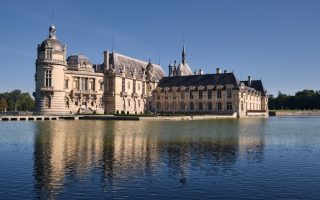Is Grenoble France’s Greenest City?
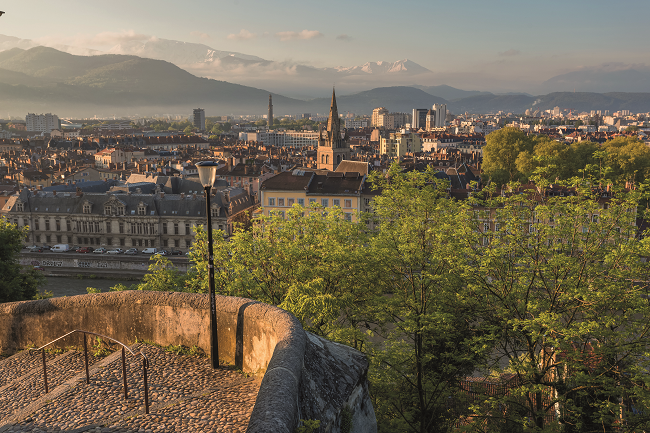
As last year’s European Green Capital, Grenoble is at the forefront of the environmental movement in France – but could it be the country’s greenest city? Explore this gateway to the Alps, in the Isère département, to find out.
Queuing up for lunch in a school canteen in Grenoble, the scene looks much the same as anywhere else in France – but with one important difference. Here, the default setting for meals is vegetarian. Meat and fish are available, but pupils have to request that menu.
This might not seem like much of a big deal in more veggie-orientated countries, but in meat-mad France, this is game-changing stuff. What is more, the proportion of organic and/or locally-sourced products has increased to 60% in the city’s schools – and 95% in its crèches (nursery schools).
“This year, 7% of the kids have chosen the vegetarian option – three times more than the national average,” says Grenoble’s mayor, Éric Piolle. “And there is once or twice a week a vegetarian menu for every child, whatever menu they have chosen. This way, more than a half of the meals we serve are vegetarian.
“It’s a big step for the health of our children because we eat too much meat, and for the climate, as meat production is the first cause of climate change, and of course for animal welfare.”
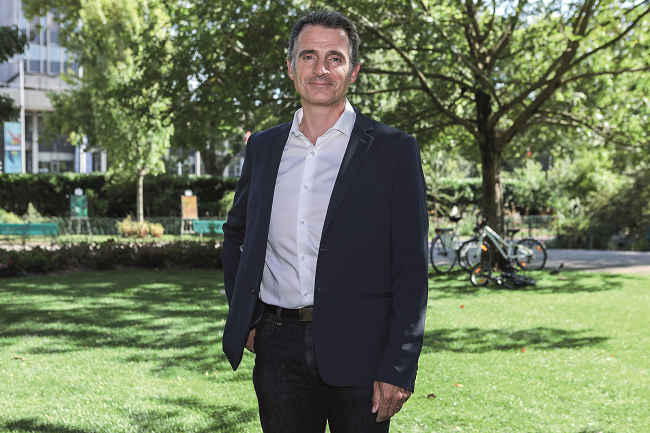
© Sylvain Frappat – Ville de Grenoble
A benchmark city
This is just one of many impressive green initiatives in Grenoble. Located at the meeting point of several mountain ranges in the Alps – where climate change has been particularly evident – the city has a long-standing reputation for innovation and sustainability, which culminated in it being named European Green Capital for 2022.
Notably, Grenoble was the first city in France to adopt a local Climate Action Plan, back in 2005. It was also the country’s first large city to widely apply the 30km/h speed limit, creating one of the largest Low-Emission Zones. Then, in 2020, Grenoble became the country’s first city to have a motorway lane specifically reserved for car sharing and a comprehensive carpooling service with guaranteed departures. Even the local sewage works is part of the story, producing enough biogas to power 125 buses and the city’s refuse trucks.
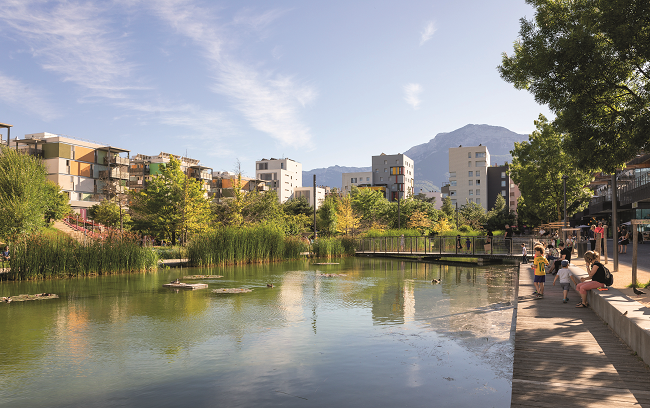
© Pierre JAYET, Agence Grenoble Alpes
On top of all that, Grenoble is also one of the country’s leading cities for cycling. Although surrounded by mountains, it is relatively flat, with some 200km of bike paths – and, according to the latest Barometer of Cycling Cities, it has the best bicycle facilities for a city of its size. No wonder, then, that so many residents choose bicycles over station wagons, as is the case with local plumber and heating engineer Antoine Laperche, who conducts his entire business by bike.
“My choice to travel only by cargo bike comes, above all, from the desire to have the lowest possible carbon footprint – everything with the strength of the calves!” says Antoine, who is even able to transport a bathtub in his trailer.
“The cargo bike also solves other issues encountered in the city centre: parking problems, congestion and the increasing cost of energy. On a bike, all these problems disappear.
“I’m not saying that all jobs can be done by bicycle, but some, like mine, can be done in city centres without great difficulty. There is still a long way to go to achieve the objectives set by the COPS, but it is by showing that changes are possible and desirable that we will be able to maintain a viable planet.”
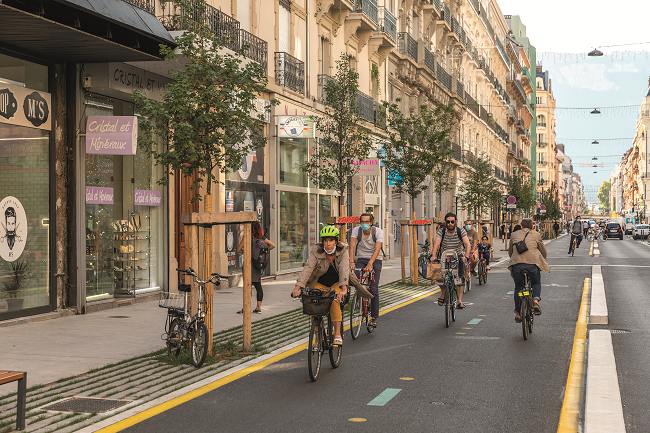
© Lucas Frangella – Grenoble Alpes Métropole
Eco-friendly tourism
Of course, it’s not only the residents of Grenoble who benefit from all these green initiatives but visitors to the city as well. From taking a zero-carbon trip on the cable cars, with their spectacular view over the mountains, to discovering the dedicated eco-districts, such as the award-winning Caserne de Bonne, to visiting pioneering projects like the new Le Bar Radis with its greenhouse, market-gardening space and café-restaurant on the top of a car park, there is much here for the eco-conscious traveller. You can find out more on one of the eco-themed guided city tours by Grenoble Alpes Tourisme.
Not surprisingly, much of the tourist accommodation is eco-friendly, and two establishments have recently been awarded the coveted international eco-label, the Clef Verte: the Appart City Confort Grenoble Inovallée and the Auberge de Jeunesse HI Grenoble Agglomération. Another 11 hotels and restaurants are hoping to make the list this year.
“The Clef Verte label distinguishes establishments that demonstrate efficient, continuous and dynamic environmental management as well as responsible practices,” explains Cédric Léchelle, the director of Appart City Confort Grenoble Inovallée, a three-star apart-hotel on the outskirts of Grenoble. “It provides a guarantee of confidence for travellers who favour responsible tourism.”
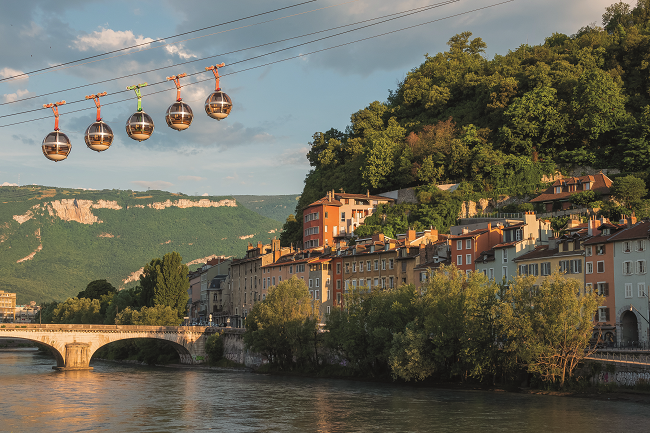
© Pierre JAYET, Agence Grenoble Alpes
A bright future
So, with its year as European Green Capital now over, what does the future hold for Grenoble? Well, despite all its impressive achievements, it turns out it’s just getting started – with some ambitious goals ahead.
While the city’s heating is already generated by almost 80% renewable and recovered energies, the target is to make that 100% by 2033. Similarly, although some 10,000 trees have been planted since 2014, the aim is to plant a total of 30,000 before 2030. And overall, the plan is for the city to be carbon neutral by 2040.
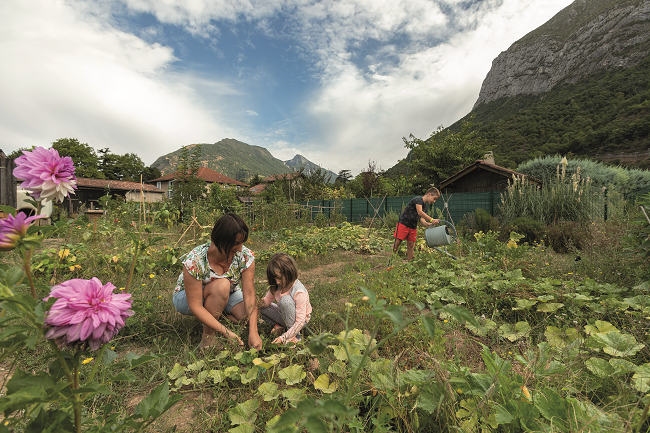
© Lucas Frangella – Grenoble Alpes Métropole
Certainly, as a place that is very much on the front line of the climate crisis, it has never been more important. The average temperature in the Alps has already increased by 2°C since the start of the 20th century – compared with an average of 1.4°C in the rest of France. Equally, the surface area of the glaciers in the French Alps has shrunk by 38% in about 50 years. Then, of course, there is the recent lack of snow.
“Here, in the Alps, climate change is happening twice as fast as in the rest of Europe, so we have to be twice as ambitious,” says Éric Piolle. “We are very proud of all the work we have done, but we also know that there is a long way to go. So, we refuse to rely only on our past achievements; the work here has just begun.”
From France Today Magazine
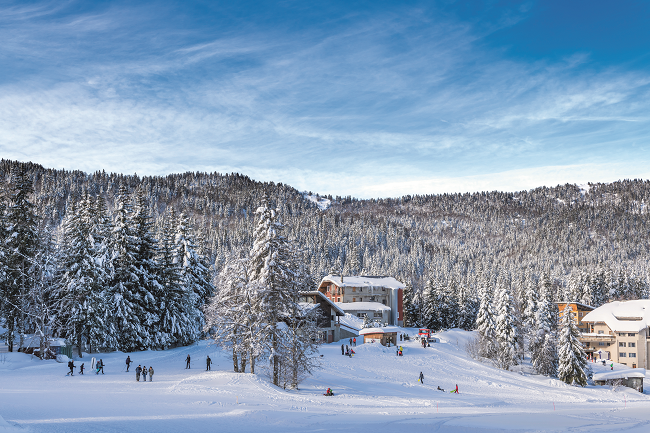
© Alain DOUCE, Agence Grenoble Alpes
Lead photo credit : © Pierre JAYET, Agence Grenoble Alpes
Share to: Facebook Twitter LinkedIn Email
More in city breaks, eco-tourism in France, French cities, green tourism, grenoble, short breaks, the Alps
Leave a reply
Your email address will not be published. Required fields are marked *



